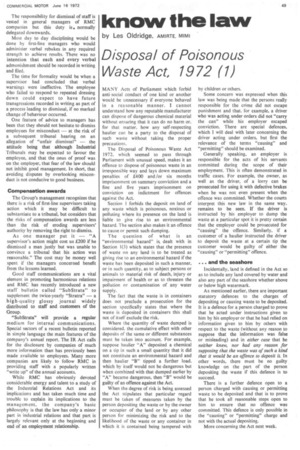know the law
Page 51

If you've noticed an error in this article please click here to report it so we can fix it.
by Les Oldridge, AMIRTE, MIMI
Disposal of Poisonous Waste Act, 1972 (1)
MANY Acts of Parliament which forbid anti-social conduct of one kind or another would be unnecessary if everyone behaved in a reasonable manner. I cannot understand how any reputable manufacturer can dispose of dangerous chemical material without ensuring that it can do no harm or for that matter, how any self-respecting haulier can be a party to the disposal of such waste without taking the proper precautions.
The Disposal of Poisonous Waste Act 1972, which seemed to pass through Parliament with unusual speed, makes it an offence to dispose of poisonous waste in an irresponsible way and lays down maximum penalties of £400 and /or six months imprisonment on summary conviction and a fine and five years imprisonment on conviction on indictment for offences against the Act.
Section 1 forbids the deposit on land of any waste which is poisonous, noxious or polluting where its presence on the land is liable to give rise to an environmental hazard. The section also makes it an offence to cause or permit such dumping.
The question of what is an "environmental hazard" is dealt with in Section 1(3) which states that the presence of waste on any land is to be treated as giving rise to an environmental hazard if the waste has been deposited in such a manner, or in such quantity, as to subject persons or animals to material risk of death, injury or impairment of health or as to threaten the pollution or contamination of any water supply.
The fact that the waste is in containers does not preclude a prosecution for the section specifically states that where the waste is deposited in containers this shall not of itself exclude the risk.
Where the quantity of waste dumped is considered, the cumulative effect with other deposits of the same or different substances must be taken into account. For example, suppose haulier "A" deposited a chemical on a tip in such a small quantity that it did not constitute an environmental hazard and then haulier "B" tipped a further load, which by itself would not be dangerous but when combined with that dumped earlier by "A" became dangerous, then "B" would be guilty of an offence against the Act.
When the degree of risk is being assessed the Act stipulates that particular regard must be taken of measures taken by the person depositing the waste or by the owner or occupier of the land or by any other person for minimizing the risk and to the likelihood of the waste or any container in which it is contained being tampered with by children or others.
Some concern was expressed when this law was being made that the persons really responsible for the crime did not escape punishment and that, for example, a driver who was acting under orders did not -carry the can" while his employer escaped conviction. There are special defences, which I will deal with later concerning the driver acting under orders, but first the relevance of the terms "causing" and "permitting" should be examined.
Generally speaking, an employer is responsible for the acts of his servants committed during the scope of their employment. This is often demonstrated in traffic cases. For example, the owner, as well as the driver, of a lorry can be prosecuted for using it with defective brakes when he was not even present when the offence was committed. Whether the courts interpret this new law in the same way, remains to be seen. If the driver is instructed by his employer to dump the waste at a particular spot it is pretty certain that the employer could be prosecuted for "causing" the offence. Similarly, if a customer of a haulier instructed the driver to deposit the waste at a certain tip the customer would be guilty of either the "causing" or "permitting" offence.
... and the seashore Incidentally, land is defined in the Act so as to include any land covered by water and also any part of the seashore whether above or below high watermark.
As mentioned earlier, there are important statutory defences to the charges of depositing or causing waste to be deposited. It is a defence for a person charged to prove that he acted under instructions given to him by his employer or that he had relied on information given to him by others with respect to the waste (without any reason to suppose that the information was false or misleading) and in either case that he neither knew, nor had any reason for supposing that the waste was of such a kind that it would be an offence to deposit IL In other words, there must be no guilty knowledge on the part of the person depositing the waste if this defence is to succeed.
There is a further defence open to a person charged with causing or permitting waste to be deposited and that is to prove that he took all reasonable steps open to him to ensure that no offence was committed. This defence is only possible in the "causing" or "permitting" charge and not with the actual depositing.
More concerning the Act next week.




























































































